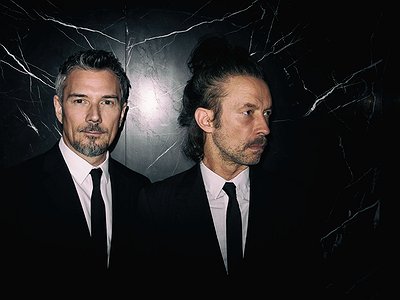Name: Roberto Di Gioia
Nationality: Italian-German
Occupation: Pianist, composer
Current release: Roberto Di Gioia teams up with Peter Kruder for ,,--------,,, out May 26th 2023 via PEYO.
Recommendations: Jimi Hendrix, Electric Ladyland; 1984, George Orwell; Drawings by Otto Dix.
[Read our Peter Kruder interview]
Over the course of his career, Roberto Di Gioia has worked with a wide range of artists, including Jan Bang, Nils Petter Molvaer, and Eivind Aarset.
[Read our Jan Bang interview]
[Read our Nils Petter Molvaer interview]
[Read our Eivind Aarset interview]
When I listen to music, I see shapes, objects and colours. What happens in your body when you're listening? Do you listen with your eyes open or closed?
Open - otherwise I won't see my psychedelic wallpaper.
What were your very first steps in music like - and how do you rate gains made through experience versus the naiveté of those first steps?
Since every day is a new day, I look at music the same way: I start every day from scratch, and the very first thought is and remains the best.
It's always the momentum that counts.
According to scientific studies, we make our deepest and most incisive musical experiences between the ages of 13-16. What did music meant to you at that age and what’s changed since then?
I listened to Beatles, Kraftwerk, Coltrane, Chopin, Hendrix. Music was limitless for me.
Today I experience it in exactly the same way. I thrive on good music, no matter what kind. And there is - thank God - plenty of it!
Over the course of your development, what have been your most important instruments and tools and how have they shaped your perspective on music?
The piano. The instrument allows you the widest possible range of harmonies, melodies and rhythm at the same time.
What, would you say, are the key ideas behind your approach to music and what motivates you to create?
My key idea is work. Through work comes inspiration - not the other way around.
Paul Simon said “the way that I listen to my own records is not for the chords or the lyrics - my first impression is of the overall sound.” What's your own take on that and how would you define your personal sound?
I don't listen to my records either. It's like telling myself a joke. You already know it.
I love melodies that stay in my own head.
Sound, song, and rhythm are all around us, from animal noises to the waves of the ocean. What, if any, are some of the most moving experiences you've had with these non-human-made sounds? In how far would you describe them as “musical”?
I love the rhythm that pigeons make. It's a 5/4 rhythm that they stick to hard as nails. It sounds like they're looping. They don't speed up or slow down. That impresses me every time.
From very deep/high/loud/quiet sounds to very long/short/simple/complex compositions - are there extremes in music you feel drawn to and what response do they elicit?
It all depends on my mood. Music is food: what do I need right now? Sweet, sour, salty, spicy?
From symphonies and traditional verse/chorus-songs to linear techno tracks and free jazz, there are myriads ways to structure a piece of music. Which approaches work best for you – and why?
Whatever music, whatever style I'm working on, I serve the music, or the piece, whatever it needs.
Could you describe your creative process on the basis of one of your pieces, live performances or albums that's particularly dear to you, please?
Our album "--------" was born from quite spontaneously found first ideas that were, so to speak, faster than we were. Then we considered the idea and fed the piece with all that it still needed.
The biggest difficulty is always not to add too much to it. I know musicians who keep messing around with a fragment, piece, until the actual idea is dead. I always try to avoid that.
Sometimes, science and art converge in unexpected ways. Do you conduct “experiments” or make use of scientific insights when you're making music?
We experiment with the right temperature of water for green tea.
How does the way you make music reflect the way you live your life? Can we learn lessons about life by understanding music on a deeper level?
Everything is connected to everything else. You cannot cook a good sauce with bad oil, old garlic, tomatoes that taste of nothing.
Do you feel as though writing or performing a piece of music is inherently different from something like making a great cup of coffee? What do you express through music that you couldn't or wouldn't in more 'mundane' tasks?
Do everything gently, calmly and with concentration, and with the necessary dose of humour.
Then, let it go again.
Every time I listen to "Albedo 0.39" by Vangelis, I choke up. But the lyrics are made up of nothing but numbers and values. Do you, too, have a song or piece of music that affects you in a way that you can't explain?
The Beatles - "Revolution Nr.9", White Album.
If you could make a wish for the future – what are developments in music you would like to see and hear?
More risk, away from indifference; And 10-minute intros - even for pop songs.




